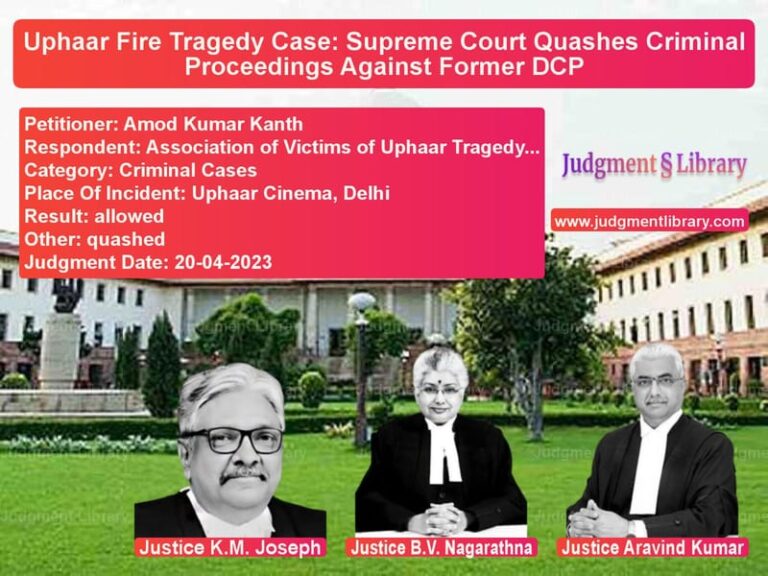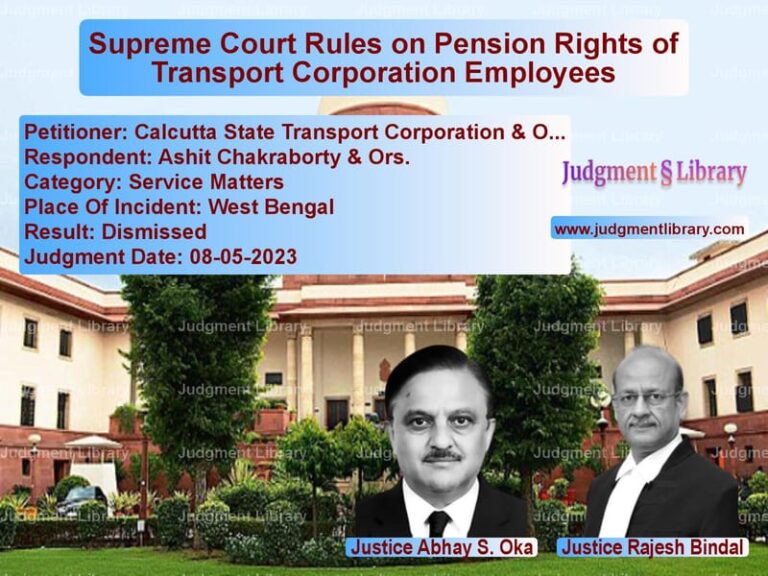Equal Pension Benefits for Bank Retirees: Supreme Court’s Ruling on Dearness Relief
The case of United Bank of India v. United Bank of India Retirees’ Welfare Association focused on the disparity in dearness relief between pre-November 2002 and post-November 2002 retirees. The Supreme Court addressed the issue of whether pensioners who retired before November 2002 should receive the same dearness relief as those who retired after this date.
Background of the Case
The dispute arose when the United Bank of India Retirees’ Welfare Association filed a writ petition, arguing that pensioners who retired before November 2002 were being discriminated against in terms of dearness relief. The petitioners contended that all retirees should be entitled to the same benefits as per the pension regulations and previous settlements.
The High Court of Calcutta ruled in favor of the retirees, directing the bank to ensure equal dearness relief for all pensioners. The bank appealed this decision to the Supreme Court, arguing that the differentiation was based on legitimate policy decisions and financial considerations.
Key Legal Issues
- Whether the differentiation in dearness relief between pre-November 2002 and post-November 2002 retirees was arbitrary and discriminatory.
- Whether the settlement agreements between banks and employee unions could override pension regulations.
- Whether the doctrine of legitimate expectation applied in ensuring uniform pension benefits.
Arguments by the Petitioner (United Bank of India)
The bank argued that:
- The differentiation in dearness relief was based on a valid and negotiated settlement agreement.
- The pension regulations did not guarantee uniform dearness relief across all categories of retirees.
- Implementing equal dearness relief for all retirees would impose a significant financial burden on the bank.
- The Supreme Court had previously upheld similar classifications in pension schemes.
Arguments by the Respondent (Retirees’ Welfare Association)
The retirees contended that:
- The disparity in dearness relief violated their fundamental right to equality under Article 14 of the Constitution.
- The pension regulations and earlier agreements mandated parity in pension benefits.
- Inflation affects all retirees equally, and providing different rates of dearness relief based on the date of retirement was arbitrary.
- The Reserve Bank of India (RBI) had already granted uniform dearness relief to its pensioners, and public sector banks should follow the same approach.
Supreme Court’s Observations
The Supreme Court examined the historical context of pension regulations and previous settlements. It observed:
“The purpose of pension and dearness relief is to provide financial security and neutralize the effects of inflation. Distinguishing between retirees based solely on the date of retirement creates an arbitrary classification.”
The Court also referred to the landmark judgment in D.S. Nakara v. Union of India, which held that pensioners form a homogeneous class and should not be subjected to differential treatment without a rational basis.
“If pensioners are classified into different categories without any rational justification, it violates the principles of equality and non-discrimination.”
Final Judgment
The Supreme Court upheld the High Court’s ruling and directed the bank to provide uniform dearness relief to all retirees, irrespective of their date of retirement. The Court emphasized:
“Pension is not a bounty but a right. The differentiation in dearness relief among pensioners is unjustified and must be rectified to ensure fairness.”
Implications of the Judgment
The ruling has significant implications for banking sector retirees and pension policies in general:
- Ensures uniform pension benefits for all retirees, preventing arbitrary classifications.
- Establishes a precedent for challenging discriminatory pension schemes in public sector banks.
- Reinforces the principle that pension and dearness relief are essential social security measures.
- Encourages financial institutions to adopt a more equitable approach to retirement benefits.
Conclusion
The Supreme Court’s decision in United Bank of India v. United Bank of India Retirees’ Welfare Association is a landmark judgment in pension law. By striking down the arbitrary classification of pensioners based on their retirement date, the Court has reinforced the principle of equality in retirement benefits and set a strong precedent for future pension-related disputes.
Petitioner Name: United Bank of India.Respondent Name: United Bank of India Retirees’ Welfare Association & Ors..Judgment By: Justice Uday Umesh Lalit.Place Of Incident: India.Judgment Date: 16-05-2018.
Don’t miss out on the full details! Download the complete judgment in PDF format below and gain valuable insights instantly!
Download Judgment: United Bank of India vs United Bank of India Supreme Court of India Judgment Dated 16-05-2018.pdf
Direct Downlaod Judgment: Direct downlaod this Judgment
See all petitions in Pension and Gratuity
See all petitions in Public Sector Employees
See all petitions in Employment Disputes
See all petitions in Judgment by Uday Umesh Lalit
See all petitions in dismissed
See all petitions in supreme court of India judgments May 2018
See all petitions in 2018 judgments
See all posts in Service Matters Category
See all allowed petitions in Service Matters Category
See all Dismissed petitions in Service Matters Category
See all partially allowed petitions in Service Matters Category







